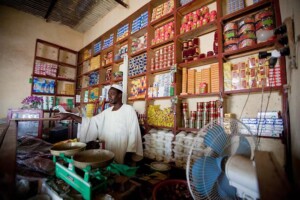World Bank to provide $100 mn to WFP for Sudan food emergency project
At the request of the international community, the World Bank yesterday signed an agreement with the United Nations World Food Programme (WFP) to provide $100 million in financing directly to WFP for the new Sudan Emergency Safety Nets Project.
 WFP staff load bags of food into lorries in North Darfur (Albert González Farran / UNAMID)
WFP staff load bags of food into lorries in North Darfur (Albert González Farran / UNAMID)
At the request of the international community, the World Bank yesterday signed an agreement with the United Nations World Food Programme (WFP) to provide $100 million in financing directly to WFP for a new food emergency project. World Bank funding under agreements signed with the Government of Sudan remains paused.
The new Sudan Emergency Safety Nets Project responds to the deep food insecurity in Sudan caused by a poor harvest and rising food prices, the Word Bank said in a press release yesterday.
The project is funded through the support of the European Union, United Kingdom, France, Germany, Sweden, the Kingdom of Saudi Arabia, Netherlands, Norway, Canada, Italy, Finland, Spain, Ireland, and the State and Peacebuilding Fund to the Sudan Transition and Recovery Support Trust Fund (STARS), an umbrella coordination platform for World Bank engagement in Sudan.
It aims to provide cash transfers and food to more than two million food insecure beneficiaries in 11 states in Sudan based on a vulnerability assessment carried out by WFP, the Wold Bank stated.
“While funding under agreements signed with the Government of Sudan remains paused, development partners are pleased to provide direct support to the Sudanese people during this critical time. This is in line with our Fragility, Conflict, and Violence Strategy which focuses on protecting the human capital of the most vulnerable groups in times of crisis,” said Ousmane Dione, World Bank Country Director for Eritrea, Ethiopia, South Sudan, and Sudan.
“Any decision to resume financing to the government will be made following an assessment of the situation. The World Bank continues to closely monitor the situation and there is no specific deadline for such decision.”
“While funding under agreements signed with the Government of Sudan remains paused, development partners are pleased to provide direct support to the Sudanese people during this critical time” – Ousmane Dione, World Bank Country Director for Eritrea, Ethiopia, South Sudan, and Sudan
The funds will be channelled solely through the WFP to scale up the food security response and provide direct support to the most vulnerable people of Sudan. Priority will be given to women, children, elders, and those with disabilities. Support will be provided primarily through cash transfers. Where possible, mobile payments will be made to beneficiaries. Specific measures will be taken to reach remote populations without access to internet. Where beneficiaries cannot buy sufficient food in local markets, they will receive direct food assistance instead of cash.
Food insecure
According to the latest estimates, one-third of the population, or 15 million people, face food insecurity throughout the lean season in Sudan, which lasts through September.
The UN food agency in Sudan told Radio Dabanga in a statement on July 14 that it was facing a funding shortfall of $366 million from now until the end of the year.
Because of the steep price increases, the cost of a WFP local food basket in Sudan rose in June by 8.4 per cent, representing a 57.8 per cent increase since January.
“WFP is currently in a position where we are having to prioritise assistance based on the resources available,” the WFP said in the statement. “These are always heart wrenching decisions to make, knowing that we cannot help everyone in Sudan who needs it”.











 and then
and then